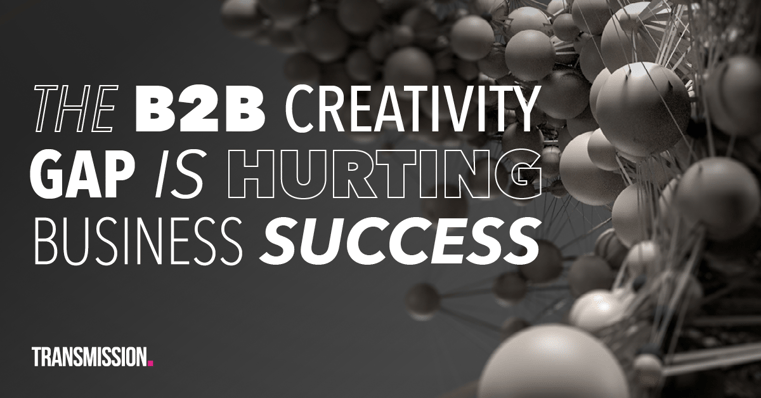
B2B marketers are still struggling with brand personality, stand out, and creativity. But what can they do about it?
You’ve heard it a thousand times before, but B2B has a creativity problem. Pedestrian ads, stock imagery, and brand voices devoid of personality plague the industry like an itch you can’t quite scratch. But why?
B2B marketers have been historically guilty of a tunnel-vision focus on product-led messaging, leaving little room for investment in creative brand building. But as times change, so do the views of businesses.
We’re pleased to find that our ‘State of B2B Brand Building’ research report reveals marketing leaders have started to recognise brand as a strategic business asset that drives business outcomes. And amid today’s hyper-competitive B2B marketplace and the pioneering work of Professor John Dawes’ 95:5 guidance, organisations are finally looking to creativity to build lasting stand out.
Waking up to the power of creativity in B2B
To build mental availability in the approximately 95% of out-market B2B buyers, businesses have quickly realised their brand needs to more than persuade – it needs to move the hearts and minds of their target audience. This is reflected in how 42% of the 500 senior B2B brand marketers we surveyed stated that improving creative stand out and creative identity were their second most important focus areas in the year ahead.
Unfortunately, B2B’s creativity problem is less about attitudes and more about actions.
Though marketers are well aware of the importance of creativity in brand building, we’re yet to see tangible changes in the way organisations market themselves. Research conducted by The B2B Institute and System1 shows that 77% of B2B ads score one out of five for creative effectiveness, meaning they have little to no effect on revenue growth. Moreover, our findings found that, of all the brand health indicators assessed by B2B marketing leaders, brand differentiation received the lowest mean score.
As B2B brands face increased market competition, creative brand marketing can act as a point of distinction. Insights, data, and planning can help uncover gaps in the market. But it’s creativity that articulates that insight clearly, authentically, and in a way that engages target audiences. Organisations need to dig deep and focus on the human truth of their brand proposition to make a complicated world immediately understandable. However, it takes conviction to follow through.
B2B boardroom fears of embracing new and more creative brand building strategies are hampering their business’ success – despite a growing number of marketing leaders recognising its importance. Organisations are often guilty of waiting for market leaders to push the creative envelope, only to follow suit without doing anything differently. Instead, brands need to be willing to take that first step towards harnessing the potential of creativity if they want to stay relevant going forward.
The need for creativity without borders
With the rise of self-serve channels across B2B customer journeys, buyers are increasingly information gathering alone, leaving companies with little time to actively influence purchase decisions. It’s here where an investment in highly creative brand experiences can yield results: Helping brands become more trustworthy and memorable throughout the buyer journey.
However, our research shows that brand experience remains a top challenge for B2B marketing leaders today. While 36% say their ability to control brand reputation and risk through brand experiences is their number one brand building concern, an almost equal 33% don’t see it as a brand building priority compared to initiatives like strengthening brand awareness.
B2B leadership teams have always favoured hard commercial metrics over softer, more emotional cues like positive brand sentiment or brand trust due to ease of measurement. But in limiting the scope of creativity to a lick of paint and a new logo, B2B businesses are neglecting the creative experiences that define truly distinctive brands.
How can B2B tackle its creativity problem?
B2B buyers in the post-COVID market are looking for emotional connections and increased relevance from brands they engage with. Investing in creativity at a brand platform level encourages more authentic relationships with buyers, positively affecting stakeholder value.
Agencies have long offered clients a ‘three route’ rule to make pitched work buyable. However, B2B brands no longer have the luxury of time or market share to play it safe. Tried and tested needs to stay just that – a thing of the past. And the organisations that look to the future by trusting their agency partners or in-house teams to deliver the unexpected are those who’ll enjoy growth and success in the marketplace.
B2B brand marketers also need to do more to demonstrate how creativity and brand building can be more effective to revenue growth than demand generation or ABM. Creativity is a strategic mindset, and creative leaders must learn to be better relationship builders if they’re to get buy-in from the board. And this shift in mindset should also apply to how B2B brands approach their use of platforms.
Though there are still uncertainties around how the metaverse will be used in B2B, we found that 21% of organisations say they are actively using it to create more immersive brand experiences. And perhaps more surprisingly, a massive 57% say they are planning to in the next 12-24 months – paving the way for more engaging and valuable brand experiences in the future.
B2B organisations are finally taking creative brand building more seriously. Our respondents are repositioning themselves away from the ‘safe and steady’ values of traditional B2B marketing – using brand to position themselves more uniquely to attract attention and intrigue from prospects. But while brands in B2B continue to slowly wake up to the power of creativity, the trailblazers are the ones set to benefit the most.
To learn more about the opinions, challenges, and priorities of 500 B2B marketing leaders worldwide, download our free report here. Or find out how Transmission can help you with B2B branding on our site.